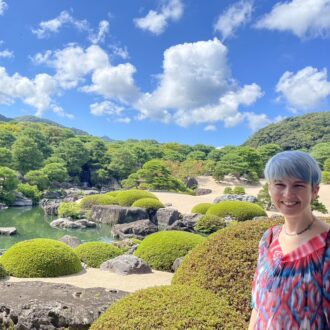Thesis: Planting identity in Hiroshima: the case of Shukkei-en Garden in paintings, poetry, and prose.
Supervisor: Dr Stephen Whiteman
Advisor: Professor Anton Schweizer (Kyūshū University)
Funded by Consortium for the Humanities and Arts South-East England (CHASE) with additional support from The Great Britain Sasakawa Foundation
Established in 1620 in Hiroshima, a provincial yet historically crucial locale, Shukkei-en (The Garden of Miniaturised Views) is today primarily known as the villa estate of generations of daimyō (domain lord) of the Asano house and considered ‘representative’ of an Edo period (1603-1867) garden. However, reducing the garden to a static phenomenon of the Edo period negates its significant role thereafter, particularly, but not limited to, the garden’s changing function during Japan’s imperial exploits (1868-1945) and its reconstruction following World War II, both part of nationwide schemes to meet specific political and social needs.
Seeking to bridge the gap between the gardens of the Edo period and the ‘modern’ era, I aim to write a garden history based around significant changes to the physical and cultural formation of Shukkei-en. My project documents the garden’s shift from private daimyō residence in the Edo period to space of imperial performance beyond the Meiji Restoration (1868) and locus of collective memory upon its retrieval after World War II. Drawing comparison with various regional gardens, my project aims to expand Japanese garden studies by disclosing the multiple relationships between landscape environments and local identity rarely examined outside of major conurbations.
I take a multi-modal approach to recover the ideology of Shukkei-en’s changing patrons by gathering drawing plans and amplifying these with translations of prose and poetry garden records and readings of ink paintings, hand scrolls, woodblock prints, photography, and digital representations of the garden. Recognising the ephemerality of gardens, I supplement archival research with interviews at contemporary garden sites to create a lineage from historical figures and carry documentation of Shukkei-en and its regional counterparts into the future.
Deconstructing Shukkei-en’s 400-year history under differing ownership exposes layers of meaning and disparate garden functions resulting from continual human engagement with the landscape. Shukkei-en is an extant example of the ways in which gardens have been both stage for, and expression of, changing societal conditions throughout early modern and modern Japan.
Education
2021– : Doctorate of Philosophy in History of Art, The Courtauld Institute of Art
2018–2020: Master of Arts in History of Art and Archaeology of East Asia, SOAS University of London (Distinction)
1998–2001: Bachelor of Arts (Hons) in Geography, University of Hull (First Class)
Travel and Research Grants
2022-present: AHRC Doctoral Studentship, Consortium for the Humanities and Arts South-East England (CHASE)
2022: The Great Britain Sasakawa Foundation Travel Grant
2021–2022: The Great Britain Sasakawa Japanese Studies Postgraduate Studentship
Professional Background
Autumn 2023-Spring 2024: Exhibition Translator, Dai Yoshiwara special exhibition, The University Art Museum, Tokyo
Spring 2023: Research Assistant to Dr Stephen Whiteman, The Courtauld Institute of Art, London
2022-2023: Guest Researcher, Kyūshū University, Fukuoka
2015-present: Private Language Tutor, Translator, and Proof-reader
Volunteer Work
2020-present: British Museum
I am based in the Japan section of the Asia department and primarily work on research, documentation, and photography of Japanese objects in storage, including surimono woodblock prints, Buddhist hanging scrolls, ceramics, and metal fittings for swords. I also assist in the compilation of a comprehensive library of Japanese art and artist-based literature and translations of Japanese texts for exhibition catalogues.
2017-2020: World Museum Liverpool
I worked for the Ethnology department where my main responsibility was documentation of a collection of preparatory sketches by Taki Katei (1830-1901) that lay the foundation for the ‘Drawing on Nature: Taki Katei’s Japan’ exhibition in 2019. I actively contributed to each stage of the exhibition development process, sourced contributors from Japan for programmes that ran alongside the exhibition and assisted the Education department in delivery of Japan-based family-focused events and workshops for school groups.
Papers and Talks
‘Shukkei-en Garden in its formative years (1620-1662): A place of pleasure in peacetime or a practical provision for the province?’ The Courtauld Year Three Symposium, 16-17 May 2024
‘Provincial daimyō gardens of early Edo Japan: A place of pleasure or a practical provision?’ 12th Forum East Asian Art History, Heidelberg University, 10-11 May 2024
‘Moving beyond the representative daimyō garden: Shukkei-en Garden as a place of protection.’ The British Association for Japanese Studies Conference, Sheffield University, 2 February 2024
‘Planting identity in Hiroshima: The case of Shukkei-en Garden in paintings, poetry and prose.’ Kyūshū University, 18 July 2023
‘Strolling through history: Recovering the multiple functions of provincial daimyō gardens of Edo period Japan.’ The Courtauld Year Two Symposium, 10 May 2023
‘An Edo period provincial garden in pictures, poetry and prose: The case of Shukkei-en Garden, Hiroshima.’ The British Association for Japanese Studies Conference, University of East Anglia, 25 February 2022
Affiliations
BAJS (British Association for Japanese Studies)
Research Interests
- Garden histories, specifically Japanese provincial daimyō gardens
- Urban history of Japan, particularly physical and represented spaces of the Edo period
- Japanese visual culture and uses of visual imagery to construct and maintain power
